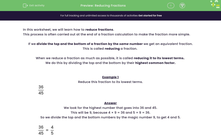In this activity, we will learn how to simplify fractions.
This process is often carried out at the end of a fraction calculation to make the fraction more simple.
If we divide the top (the numerator) and the bottom (the denominator) of a fraction by the same number we get an equivalent fraction.
This is called simplifying a fraction.
When we simplify a fraction as much as possible, it is called reducing it to its lowest terms.
We do this by dividing the numerator and the denominator by their highest common factor.
Let's try some example questions to see how this works!
Example 1
Simplify this fraction to its lowest terms:
36/45
Answer
We look for the highest number that goes into 36 and 45.
This will be 9, because 4 × 9 = 36 and 5 × 9 = 36.
So we divide the numerator and the denominator by the magic number 9, to get 4 and 5.
We cannot simplify this any further, so the answer is: 4/5
36/45 = 4/5
Example 2
Simplify this fraction to its lowest terms:
64/96
Answer
Sometimes it is hard to find the highest common factor.
We look for any number that goes into 64 and 96.
This could be 8, because 8 × 8 = 64 and 12 × 8 = 96.
So we divide the numerator and the denominator by the magic number 8, to get 8 and 12.
64/96 = 8/12
Now we can simplify again by looking for the highest number that goes into 8 and 12.
This is 4 because 2 × 4 = 8 and 3 × 4 = 12.
So we divide the numerator and the denominator by the magic number 4, to get 2 and 3.
So the answer is:
2/3
Now it's time to try some questions yourself.









